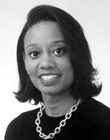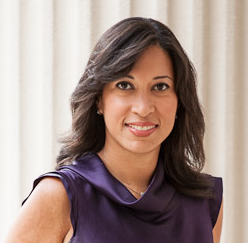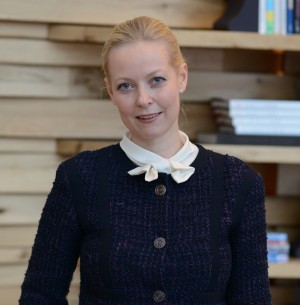 By Melissa J. Anderson (New York City)
By Melissa J. Anderson (New York City)
A strong proponent of mentoring and the continued expansion of women’s leadership roles in the legal industry, Shearman & Sterling partner Denise Grant also believes it is important to step back and take a broad view.
“At the end of the day, when thinking about the challenges and barriers for women in law, they’re relative,” she explained. “Growing up the daughter of a diplomat and now as an international transactional lawyer, I’ve traveled all over the world. I’ve seen women denied basic rights and opportunities, like going to school, being able to vote, being able to speak for themselves. In relative terms, the barriers we face here pale in comparison.”
She continued, “The real challenge for each of us is to find our own path. You may bump into a wall, but the challenge is for you to decide how to get beyond that wall. Do you scale it? Do you dig under it? Do you find a way around it?”
Grant, a partner in Shearman & Sterling’s Project Development & Finance Group and co-chair of the firm’s Diversity Committee, was also the firm’s first black partner. She is proud of her career and the opportunity to open doors for others where there may have been a wall before, and she encourages other senior female role models to not only open doors but to help usher women through them.
A Lifer at Shearman & Sterling
Grant, originally from Guyana, grew up in the United Kingdom, Canada, Belize and several countries in South America, and came to the US with her family – her father was Guyana’s Ambassador to the United States – to attend college. She studied International Relations at George Washington University and then attended Georgetown University Law School.
“I’m a lifer at Shearman & Sterling,” Grant began. After working at the firm as a summer associate during law school and then becoming a full-time associate in 1989, Grant climbed to the top of the ladder at the firm and became a partner in 1998.
“With my background in international relations, my initial goal was to garner some experience at a private law firm and then eventually join an international organization like the World Bank, the IMF, or IFC,” she recalled. “But my work here at Shearman & Sterling has always felt like a great fit.”
“Shearman did – and still does – have a significant platform in Latin America, and so the firm was my first choice based on the ability to practice law on cross-border transactions in the region where I grew up,” she continued. “And, best of all, I’ve actually done some work for the IFC and have worked on matters involving the IMF and the World Bank.”
Today, over 20 years later, Grant continues to focus on financings in Latin America. In fact, she said, one of the most interesting things she’s experienced during her career has been the evolution of transactions and the players in the region.
“When I first started doing work there, Latin America was considered an ’emerging market’ and the region was comprised of ‘developing countries,’” she explained. “But now I’ve seen many of those countries emerge. It’s very exciting to see that transformation, to have the opportunity to represent Latin American companies and financial institutions that have actually grown to such a magnitude as to acquire companies in the US and to lead internationally syndicated financings.”
For example, Grant has played a key role in supporting the expansion of Brazilian beef producer JBS, which made an important acquisition outside of Brazil and into the US with the 2009 purchase of Pilgrim’s Pride, a major chicken company. She has worked with JBS on subsequent financings for its US subsidiaries.
In Grant’s view, JBS’s expansion is indicative of a bigger trend – a changing and growing acquisition finance market for Latin America. “The more acquisitions you are seeing from Latin America into the US means that that the market is going to shift,” she said. “It’s growing more similar to US sponsor – style leveraged financing.”
Sources of Pride
In a career filled with significant professional achievement, one special accomplishment stands out, Grant says. “The professional achievement I’m most proud of is becoming the firm’s first black partner,” Grant said. “It’s historic, and also a source of pride for my parents.”
“Really, it’s a professional and personal achievement,” she continued. “Professionally, my election helped to open doors to others coming after me. On a personal level, when I was deciding what I wanted to do with my life, I knew it would include making the road easier for those coming behind me. This is very important to me.”
Political Risk and Diplomacy Skills
The road to achieving this professional success has been paved with hard work. Grant’s practice is multifaceted and calls upon so many of her skills.
“When working on cross-border transactions you often times have to deal with issues of political risk — we’re talking about expropriation, nationalization, currency conversion issues, etc. We’re also talking about war and political insurrection,” Grant said. “All of these issues come into play in my work.”
She continued, “In the past, mitigation of political risk was dealt with by lenders and investors buying an insurance policy against such risks occurring. For example, in the early 2000s, when Argentina decided to redenominate all US dollar-denominated obligations into Pesos, which created losses for many foreign lenders and investors, many of our clients made claims under their political risk insurance (PRI) policies.”
Grant explained that the insurance companies pushed back, arguing that “pesofication” was not covered by the standard PRI policies. Of course, the policyholders disagreed. As a result, many of the claims were taken to arbitration. “We had to arbitrate a number of these political risk claims – and we were successful on a number of them – but not without a lot of cost and time to our clients and significant questions about the effectiveness of these types of policies,” she said. “So now, many people try to structure their deals in such a way to work around these political issues.”
Recently, for example, Grant worked on an acquisition financing in Peru that was closing right around the time of the country’s elections. This meant that she had to assist her clients in navigating that transaction in a way that didn’t offend either political party, but at the same time provided the client with adequate protection. This called for strong diplomatic skills.
“Maybe this is genetic, because of my father’s career, but I’m interested in using diplomacy skills to have a variety of interests come together to consummate a deal, to meld all of these things together,” she explained.
Wisdom for New Lawyers
Grant’s sound practical perspective has benefited her outside the deal environment.
“One of the things I wish I had been more cognizant of when I was first starting my career was the importance of building relationships and networking. The earlier that starts, the better it is for you,” Grant advised. “It’s a small world, and it’s helpful to know as many people as you can. That includes business relationships and the like, but it also means mentoring.”
She continued, “Another point I do raise with young people is that it will help enrich your life to build up your personal profile and take stock of what you have attained. I always remind associates in our firm to enjoy the journey. Sometimes you’re so worried about what’s next that it’s hard to step back and maintain some perspective. Time goes so quickly that you’ve got to be able to stop for a moment and celebrate your achievements.”
Advice for Women in Law
“For more than half of my career I have been fortunate to be in practice groups at the firm led by women,” she said. “The women partners here at Shearman & Sterling are very supportive, and we meet regularly to discuss challenges we face individually and collectively and to support and advocate for our women lawyers. I have seen women succeed and do very well — I do think there are challenges to find the right path for each person.”
She continued, “I would be remiss if I didn’t mention that I’m also a mother of two young children. And finding that equilibrium – to be an excellent parent and, at Shearman & Sterling, an excellent lawyer, partner and business developer – is challenging.”
“We always want to give 100% to all aspects of life – it’s not a barrier, but it comes with a lot of work, to achieve the success you’d like to achieve as a mother and a partner at a successful law firm. But at the same time, my son, for instance, really wants me at his violin concert. And I want to make it look easy – I want my daughter to believe she can do anything she wants to achieve. You don’t want to let them see any chinks in your armor.”
“Luckily, I have a wonderful support system at home which really makes a huge difference,” she added.
For women entering the legal profession, Grant advises that they not allow themselves to be wallflowers. “Make sure you’re visible,” she said. “From the time you get into the firm, make sure you’re noticed. You have to do a little bit more than just be an excellent lawyer. You have to create your own opportunities.”
She added, “Do not hesitate to promote yourself at work. I do see our male counterparts doing it regularly. In fact, I see how my son already takes credit for many things, but my daughter will hesitate. We encourage her to be more proactive and not to be shy. I would say the same thing to young lawyers.”
She continued, “One of the other important things I would mention is to always remember where you came from and who helped you get to where you are. And you need to be able to afford others that opportunity.”
“Often when you are successful, it is easy to forget how important it is to mentor and help people. Here are Shearman & Sterling, even as we partners gain greater seniority, we work hard to build that next generation of partners. And in client relationships, we need to make sure to include junior women and minority lawyers in our transition plans,” she advised.
“We need to continue to build that cadre of women and diverse partners throughout the firm. The only way to break through any ceilings or walls is to work together.”
Diversity at Shearman
Grant serves as co-chair of Shearman’s diversity committee, a committee she co-founded in 1992 as a third-year associate at the firm, with John Cannon, a partner and practice group leader, and Anna Brown, a colleague and today the firm’s full-time director of global diversity and inclusion. “We have a strong culture in place here at Shearman & Sterling, and women can see that they can do very well here,” she said. “It is about charting your own path with support from others.”
In Her Personal Time
While her work at Shearman & Sterling is challenging and time consuming, Grant does work hard to maintain some important priorities.
“I’m a staunch believer in doing pro bono work,” she said. “Right now I’m working on a microfinance matter for a social business fund investing in social businesses in Haiti. This is something I’m passionate about. I also sit on the board of Edwin Gould Services for Children and Families, which is a New York State-sponsored adoption agency.”
Finally, she said she manages to take a few moments for herself. “It all comes down to that equilibrium,” she said. “You can’t forget about your self. I’ve found that it’s helpful to take a moment to take a deep breath and let it all sink in.”
“You do need to do that for yourself, even if it’s just ten minutes on the weekend – which is what I usually get!” she added with a laugh.




 By Melissa J. Anderson (New York City)
By Melissa J. Anderson (New York City)